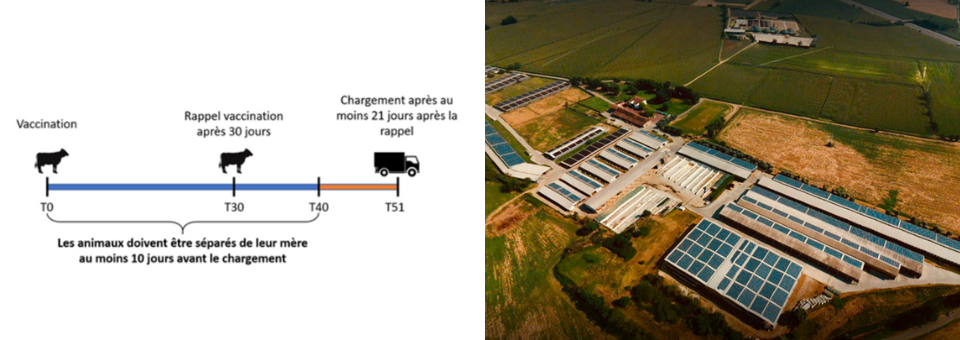
https://ec.europa.eu/eip/agriculture/en/find-connect/projects/bovine-beef-innovation-network-europe
Introduction to the challenge addressed
Cattle reared for beef production in Italy derive from abroad; mostly from France (over 80%) and to follow Ireland, Austria, Germany, or Eastern Europe.
The cattle destined for the Italian market are not vaccinated at the birth-farms by French breeders.
Vaccination at fattening-farms is strictly recommended upon arrival of the cattle. Vaccination prevents bronchopulmonary diseases which represent 90% of the diseases found in fattening-farms.
A vaccination that doesn’t work properly upon the arrival in the fattening-farm can easily lead to a state of disease (due to the high concentration of animals from different birth-farms) that must be solved with use of antibiotics.
An Italian cattle-breeder made an experiment of carrying out the vaccinations at the French birth-farms destined to transport to his farm in Italy.
The animals interested in the trial were limousine heifers of 260 to 320 kg live weight originally reared at pasture.
Description of Innovation
The Italian cattle buyer and the French breeders sign an agreement containing the animals’ protocol of vaccination.
The protocol contains the following instructions (see image in Audio-Visual-Material section):
- The type of vaccine
- The moment of the recall, after 30 days from the first intervention
- The moment of start of the transport to Italy, not before 21 days from the recall
- The period of transport after recall must not exceeds 6 months or the animal must be vaccinated again
- The calves must be separated from their mother at least 10 days before the start of the transport to Italy
Before the transport to Italy the farmer had to provide a document signed by the veterinarian who made the vaccinations.
Impact on farm performance
Cattle arriving to Italian farm that have already been vaccinated don’t require the standard vaccination protocol, which is stressful, especially in animals already weak for the long travel.
The conditions generated by transport do not ensure a physiological state to ensure the best response to the vaccine: most of the animals have a high body temperature above 39.5°C and a visible state of dehydration, and at the time of vaccination the resulting antibody response is not appropriate.
Data were collected about antibiotic administration to cattle that didn’t respond to the vaccine cover and got sick: this intervention in animal with traditional protocols vs those of the trial was drastically reduced, averagely from 38% to 8%.
The results are positive in terms of animal welfare and productivity, since animals are stronger and start earlier to eat and grow, compared to animals following the standard protocol of vaccination in Italy.
The practice has a great importance also in terms of sustainability of the production, with a remarkable reduction in use of antibiotics.
Audio-visual material

Farmer comment (for Good Practices)
The experiment carried out by our company has now become an established practice. Although the benefits are many, animals vaccinated in France account for only 15 percent of all arrivals. The main problems derive from the difficulty of incentivising French breeders to vaccinate at birth stalls. A national legislation on imports could certainly help even if it is always better to proceed with private initiatives aimed at changing the breeding mentality than forcing farmers against their will.
Further information
Annonese Farm is a Piedmontese farm in the province of Alessandria. It is a family-run business (fourth generation) and has a breeding potential of about 15,000 animals per year.